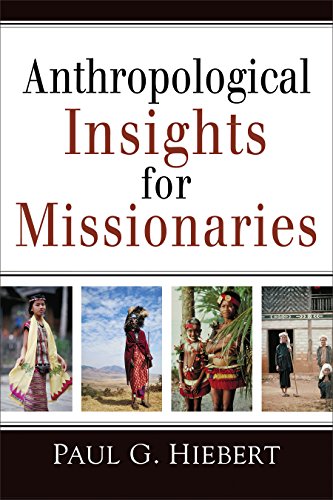Anthropological Insights for Missionaries
Paul G. Hiebert
BOOK REVIEW

In a world rife with cultural misunderstandings, where the chasm between beliefs and practices often breeds conflict, Anthropological Insights for Missionaries by Paul G. Hiebert emerges as a luminously provocative beacon. This text doesn't merely sit on the shelf of missionary literature; it compels you into the depths of cross-cultural engagement and reflection, challenging both the status quo and your own preconceived notions.
Hiebert, an eminent scholar with a lifetime dedicated to the intersection of anthropology and theology, invites you into the rich tapestry of human experience. His work serves as a clarion call for missionaries to deeply understand the cultural landscapes they are engaging with. The essence of this book revolves around the crucial idea that effective missionary work is not just about delivering a message but interpreting that message through the lens of the culture in which one operates. Think about that! How many times have we seen well-meaning efforts come up short because of a lack of cultural awareness? That's the heart-wrenching reality that Hiebert seeks to address head-on.
As you grapple with each chapter, Hiebert skillfully outlines frameworks and methodologies that not only bolster communication but ignite transformative dialogues. He emphasizes the importance of viewing any cultural context as a rich ground of potential understanding rather than a hostile terrain to be navigated with a sense of superiority. This isn't just a textbook; it's a powerful narrative roadmap encouraging you to appreciate the diversity of human life.
What makes Hiebert's insights even more compelling is their urgency and relevance. In an era where globalization is erasing geographical boundaries but failing to bridge emotional and spiritual divides, his reflections resonate fiercely. Imagine the implications of cultural incompetency in today's world where missionaries are being sent globally, often underestimating the significance of local customs and values. Hiebert tells you that this is a dangerous pitfall; ignorance can lead to harm rather than healing.
Readers have been vocal about the impact of Hiebert's teachings, with some heralding it as a revolutionary work while others grapple with its challenging vistas. Critics argue that the cultural frameworks presented, while insightful, can be overly simplistic when applied to the multifaceted realities of human societies. Yet, therein lies the beauty of the discourse. Hiebert's work encourages critical thinking, pushing you to weigh these perspectives against your own experiences and beliefs. The dichotomy between practical application and theoretical exploration creates a dynamic tension, fueling conversations that extend far beyond the pages of this book.
Delving deeper into the narrative, Hiebert doesn't shy away from discussing the historical context and the gradual evolution of missionary work-an evolution punctuated by colonial legacies and modern interpretations. He navigates through these complex waters with ease, arguing that understanding history is vital for effective cross-cultural missions. As you walk this intellectual tightrope, a sense of urgency washes over you. Are we, in our contemporary society, repeating the mistakes of the past by ignoring the lessons learned?
Picture the missionaries planning to venture into foreign lands, armed with nothing more than their faith and a limited understanding of the sensitive cultural contexts they are about to infiltrate. This is where Hiebert's insights become paramount. He conveys that cultural intelligence is not merely a nice-to-have; it is a necessity. A successful approach fosters empathy, compassion, and an open heart-an invitation to listen before being heard.
In a world teetering on the brink of cultural clashes, Hiebert's text does not just educate; it transforms mindsets. It challenges you to reflect on your own biases, your own cultural lens. No longer can you view intercultural interactions through a monolithic perspective. This book exaltedly opens your eyes to the vibrant colors of human experience, a kaleidoscope begging for your engagement.
As you turn the final pages, you won't just close the book; you'll feel compelled to act-to integrate the insights you've gleaned into your daily life, into your understanding of others. The world is a complex stage, and Hiebert has handed you the script for a more compassionate narrative. This isn't just reading; it's a call to arms in the battle against ignorance and misunderstanding.
In conclusion, Anthropological Insights for Missionaries is more than a scholarly text; it's an emotional and intellectual journey that you cannot afford to miss. Will you heed Hiebert's call to foster understanding in a world desperately needing it? The choice lies with you, but one thing is certain: this book will resonate long after you've put it down, igniting conversations and thoughts that might just change the trajectory of your life and the lives you touch. ✨️
📖 Anthropological Insights for Missionaries
✍ by Paul G. Hiebert
🧾 316 pages
1985
#anthropological #insights #missionaries #paul #hiebert #PaulGHiebert